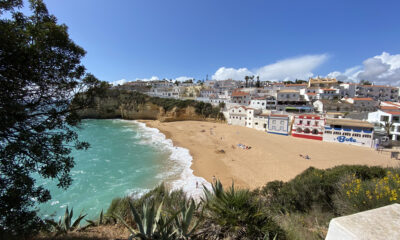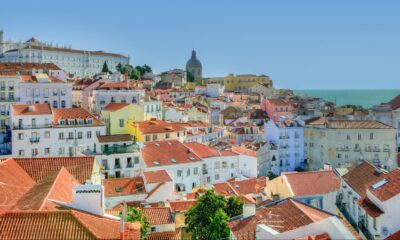Non-Habitual Residency and Simplified Tax Regime are just a couple of the many different tax regimes that exist in Portugal. If you’re considering making the sunny nation of Portugal your new home, whether on a Temporary Stay or Temporary Residency Digital Nomad Visa or any other visa, it’s essential to understand the country’s unique tax structures.
The two most attractive schemes that often surface in conversations about Portuguese taxation are the Non-Habitual Residency (NHR) and the Simplified Tax Regime. We will delve into the features, benefits, and differences between these two tax schemes to help you make an informed decision.

OCT 2023 – There have been recent updates to the Non-Habitual Resident (NHR) regime in Portugal as of 2024, which may affect digital nomads and remote workers considering Portugal as their base. The government has transitioned to a new tax regime tailored towards fostering scientific research and innovation, with a narrower scope but potential advantages for certain groups, especially those engaged in tech-centric fields.
For an in-depth look at these changes and what they mean for digital nomads and remote workers, check out our latest article: NHR no more? Portugal’s Tax Regime Redesign – Impact on Remote Workers.
Non-Habitual Residency (NHR)
The NHR scheme is designed to attract high-value-added professions and individuals with substantial income from foreign sources. The regime offers attractive tax benefits for a decade and applies to new residents who haven’t been tax residents in Portugal for the previous five years.
While the term Non-Habitual Residency (NHR) might suggest non-resident status, it’s actually quite the opposite. The NHR tax regime is specifically designed for individuals who have recently become residents of Portugal, provided they have not been tax residents in the country for the preceding five years.
Please note: You might not have min stay requirements from the tax perspective; however, if you require a visa/work permit to live in Portugal, it might require you to stay a min number of days in Portugal, e.g., Temporary Residency Digital Nomad Visa or any other visas.
In general terms, an individual is deemed to be a tax resident in Portugal if one of the following conditions is met:
- more than 183 days are spent in Portugal in any 12-month period starting or ending in the fiscal year concerned; or
- having spent less than 183 days in Portugal, an individual maintains a residence suggesting being a habitual residence in Portugal within 12 months.
An individual may benefit from this regime during a 10-year period starting from the year of his/her registration as tax resident in Portugal.
Registering with the local tax authorities is very simple for EU and Non-EU citizens. However, Non-EU citizens need a national visa and in most cases, might require a fiscal representative. Check Portugal’s Digital Nomad Visas for more info.
NHR – Income Source & Tax
A lot of sources claim that by working remotely for a non-Portuguese employer, you can get a full exemption on all foreign income, but that’s not true. It’s important to know that this only applies if your income is taxed at sourced and when Double Tax Agreements are in place. Check FAQs for the list of DTAs.
Similarly, when you are working as a self-employed or location-independent entrepreneur, you might be under the impression that by setting up your company outside of Portugal and claiming tax exemption on your foreign income and dividends, you will be able to pay zero tax, it is not as straightforward as it sounds. Check below for more details.
| TYPE OF INCOME | SOURCE | CIRCUMSTANCES | NHR TAXATION |
|---|---|---|---|
| Employment income | Portuguese | If derived from eligible occupations | 20% flat rate |
| Portuguese or foreign | If NOT derived from eligible occupations | Taxed according to the Portuguese progressive tax rates | |
| Foreign | If derived from eligible occupations and taxed at source | Exempt | |
| Foreign (except blacklisted jurisdictions) | If derived from eligible occupations but not taxed at source | 20% flat rate | |
| Self-Employment income | Portuguese | If derived from eligible occupations | 20% flat rate (normally over 75% of gross income if on the simplified regime) |
| Portuguese or foreign | If NOT derived from eligible occupations | Taxed according to the Portuguese progressive tax rates | |
| Foreign (except blacklisted jurisdictions) | If derived from eligible occupations and may be taxed at source according to the Double Tax Agreement (DTA) | Exempt | |
| Foreign (except blacklisted jurisdictions) | If derived from eligible occupations but not taxed at source according to the DTA | 20% flat rate (normally over 75% of gross income if on the simplified regime) | |
| Dividend income | Portuguese | 28% flat rate or if aggregated Taxed according to the Portuguese progressive tax rates | |
| Foreign (except blacklisted jurisdictions) | If may be taxed at source according to the DTA | Exempt | |
| Rental income from real estate and/or Capital Gains from sale of property | Portuguese | Rental taxed at 28% CGT levied on half of the gain, with possibility of reinvestment in case of main residency | Taxed according to the Portuguese progressive tax rates |
| Foreign | If may be taxed at source according to the DTA | Exempt | |
| Capital Gains from the sale of movable properties (financial assets, shares, etc) | Portuguese | Taxed according to the Portuguese progressive tax rates | |
| Foreign | If or not taxed in the country of source | 28% flat rate or if aggregated Taxed according to the Portuguese progressive tax rates |
NHR for Global Nomads
The NHR for remote employees can be beneficial if you are “taxed at the source,” meaning in your home country or employer’s country, as it might be exempt from payment in Portugal.
You can also benefit from NHR if you are self-employed or work for your own company (registered abroad or in Portugal) if your income falls into the II category of the Eligible Occupations (see FAQs below).
Just remember, if you physically work from Portugal or if you are the company’s only or main director, your income might be classified as Portuguese-born and not foreign-born. This depends on a number of factors but essentially comes down to whether the company creates a Permanent Establishment in Portugal, where most of the paying clients are based, or whether the company is effectively managed from Portugal or not; for example, is there another director manages the company from outside of Portugal or is it just you? In this type of setup, expert tax advice is highly recommended.
Simplified Tax Regime (STR)
Many remote workers moving to Portugal leverage the benefits of the Non-Habitual Resident (NHR) program; however, this might not be the optimal choice if your income comes from work performed as a freelancer or self-employed who register in Portugal. For those, Portugal offers a ‘Simplified Tax Regime’ tailored specifically for sole traders. This system is particularly beneficial if your business expenses are relatively low, and a large portion of your income translates to profit. This option is not well-suited for operations like dropshipping businesses, but it works exceptionally well for professionals such as consultants or web developers.
If your annual income is less than €200,000, you’re only taxed on 35% of it under this regime, 65% is automatically allotted to cover operating expenses. No further accounting is required. To illustrate, if your yearly income is €100,000, you’d only pay taxes on €35,000—resulting in significant tax savings! Far less than the 20% flat rate charges under NHR.
And the benefits don’t stop there. In your first year of residency in Portugal, you’re granted a 50% reduction on this rate, followed by a 25% discount in your second year. This offers an even more substantial tax relief during your initial years of Portuguese residency.
The Simplified Tax Regime, designed mainly for self-employed individuals and small businesses, offers a straightforward taxation process. It determines taxable income as a fixed percentage of gross income, eliminating the need to track and deduct business expenses. The flat rate varies depending on the nature of the activity:
The taxable profit under the Simplified Regime is then subject to the standard Portuguese progressive tax rates, which, as of 2023, range from 14.5% to 48%, depending on the income bracket.
NHR vs STR: Comparing the Differences
The choice between the NHR and the Simplified Tax Regime primarily depends on your circumstances, including your professional situation, income sources, and future plans. While the NHR caters to high-income professionals and pensioners, offering substantial tax savings on foreign income, the Simplified Tax Regime is an attractive choice for self-employed individuals and small businesses operating in Portugal, thanks to its straightforwardness.
The duration of these regimes is another essential difference. The NHR status is valid for 10 years, while the Simplified Tax Regime remains applicable indefinitely, provided the taxpayer meets the eligibility criteria.

Final thoughts
Navigating Portugal’s tax landscape may seem daunting, but the potential benefits are substantial. Both the NHR and the Simplified Tax Regime can offer you a considerable advantage, depending on your situation. The best regime for you will depend on your individual circumstances. As with any tax-related decision, it’s crucial to consult with tax professionals or legal experts to ensure you’re choosing the most beneficial path.
FAQs
What is a Double Taxation Agreements (DTAs)?
Double Taxation Agreements (DTA) are treaties between two or more countries to avoid international double taxation of income and property. The main purpose of DTA is to divide the right of taxation between the contracting countries, to avoid differences, to ensure taxpayers’ equal rights and security, and to prevent evasion of taxation.
List of Portugal’s double taxation agreements:
- Algeria, Andorra, Austria
- Bahrain, Barbados, Belgium, Brazil, Bulgaria
- Canada, Cape Verde, Chile, China, Colombia, Croatia, Cuba, Czech Republic, Cyprus
- Denmark
- East Timor, Estonia, Ethiopia
- Finland, France
- Georgia, Germany, Greece, Guinea-Bissau
- Hong Kong, Hungary
- Iceland, India, Indonesia, Ireland, Israel, Italy, Ivory Coast
- Japan
- Korea, Kuwait
- Latvia, Lithuania, Luxembourg
- Macao, Malta, Mexico, Moldova, Montenegro, Morocco, Mozambique,
- Norway
- Oman
- Pakistan, Panama, Peru, Poland
- Qatar
- Romania, Russia
- San Marino, São Tomé and Príncipe Saudi Arabia, Senegal, Singapore, Slovakia, Slovenia, South Africa, Spain, Sweden, Switzerland
- The Netherlands, Tunisia, Turkey
- Ukraine, United Arab Emirates, United Kingdom, United States, Uruguay
- Venezuela, Vietnam
List of Portugal’s blacklisted jurisdictions:
- American Samoa, Anguilla, Antigua and Barbuda (1), Antilles, Arab Republic of Yemen, Aruba, Ascension Island
- Bahamas, Bahrain, Barbados (2), Belize (1), Bermuda (1), Bolivia, British Virgin Islands (1), Brunei
- Cayman Islands (1), Channel Islands (1, 4), Christmas Island, Cocos (or Keeling) Islands, Cook Islands, Costa Rica
- Djibouti, Dominica (1)
- Falkland Islands (or Malvinas), Fiji Islands, French Polynesia
- Gambia, Gibraltar (1), Grenada, Guyana
- Honduras, Hong Kong (2)
- Island of Guam, Island of Kiribati, Island of Tokelau
- Jamaica, Jordan
- Kuwait (2)
- Labuan, Lebanon, Liberia (1), Liechtenstein,
- Maldives Islands, Marshall Islands, Mauritius, Monaco, Montserrat
- Nauru, Niue Island, Norfolk Island, Northern Mariana Islands
- Oman (2)
- Pacific Islands (3), Palau Islands, Panama (2), Pitcairn Island, Puerto Rico, Qatar (2), Qeshm Island
- Republic of Vanuatu
- Saint Helena, Saint Kitts and Nevis (1), Saint Lucia (1), Saint Vincent and the Grenadines, San Marino (2), Seychelles, Solomon Islands, St. Peter’s Island and Miquelon, Svalbard (includes Spitsbergen archipelago and Bjørnøya island), Swaziland,
- Tonga, Trinidad and Tobago, Tristan da Cunha Island • Turks and Caicos (1), Tuvalu Island
- United Arab Emirates (2)
NOTE: Jersey (Channel Islands), the Isle of Man and Uruguay were white-listed during 2017 and blacklisted again under the 2018 State Budget.
1 – These jurisdictions may eventually leave this blacklist since they have signed agreements for the exchange of information with Portugal (Andorra left this list in 01-01-2021).
2 – These jurisdictions may eventually leave this blacklist since they have signed double taxation agreements with Portugal.
3 – Remaining Pacific Islands not included in this list.
4 – Includes Alderney, Guernsey,Great Stark, Herm, Little Sark, Brechou, Jethou, Jersey and Lihou. SOURCE: Information available in the Portuguese Tax Portal
You need to become a tax resident of Portugal first, then you apply for the NHR which means that it is possible that you won’t get the NHR and you will need to pay regular taxes. In those cases, it might be possible to apply for a simplified tax regime.
The application is done online and can take a few months to be processed by the Portuguese tax authorities (much quicker if you are from within the EU), so careful forward planning is required. It can be made only once you have changed your tax residency to Portugal. If you have a value-added activity, you should have evidence available if this is ever required.
The Portuguese tax year coincides with the calendar year and runs from 1 January to 31 December.
As a Non-Habitual Resident, there are situations where you may be liable for the progressive tax rates. This happens for instance in case of Portuguese source income, or in case the income you receive is sourced in a country without any DTA with Portugal. For the latest rates, please see PWC.
List of activities on the non-habitual residency regime, that allow the taxpayer to be taxed at a flat rate of 20% on the earnings from this activity. This applies to income from employment (category I) and income from self-employment (category II).
I – Professional activities (PCP codes):
112 – General director and executive manager of a company;
12 – Directors of administrative and commercial services;
13 – Directors of production and specialized services;
14 – Directors of hotel, restaurant, commercial and other services;
21 – Specialists working in physical sciences, mathematics, engineering and similar technical fields;
221 – Physicians;
2261 – Dentists and stomatologists;
231 – Teachers at universities and higher learning establishments;
25 – Specialists in information and communication technologies (ICT);
264 – Authors, journalists and linguists;
265 – Creative artists and performing artists;
31 – Intermediate level science and engineering technicians and professionals;
35 – Information and communication technologies technicians;
61 – Market oriented farmers and qualified agricultural and livestock workers;
62 – Market oriented qualified forestry, fisheries and hunting workers;
7 – Qualified industrial, construction workers and craftsmen, including qualified workers in the fields of metallurgy, metalworking, food processing, wood manufacturing, clothing production, handicrafts, printing, manufacture of precision instruments, jewellers, artisans, electricity and electronics workers;
8 – Operators of installations and machines and assembly workers, namely fixed installations and machine operators.
The workers included in the above-mentioned professional activities shall possess at least a level 4 qualification on the European Qualifications Framework or a level 35 on the International Standard Classification of Education, or they must have five years of duly proven professional experience.
II – Other professional activities: Administrators and managers of companies that promote production investment, provided they are allocated to eligible projects and have contracts granting tax benefits signed in accordance with the Investment Tax Code approved under Decree-Law no. 162/2014 of 31 October.
As a foreign resident, you may be exempt from social security in Portugal if you contribute to a compulsory social security system in another European Union (EU) country or a country that has a bilateral social security agreement with Portugal, provided they are in possession of the relevant certificate of coverage.
- Quiz – was this article helpful? Please take a moment to answer 5 quick Questions.
- Ask A Question – confused about taxes? Join our Facebook Community & Ask A Question.
- Feedback – we are only humans, so if you see anything missing/incorrect, please let us know.
NEWSLETTER
No Spam, Just Updates!
FOLLOW US
DIGITAL NOMAD VISAS

















